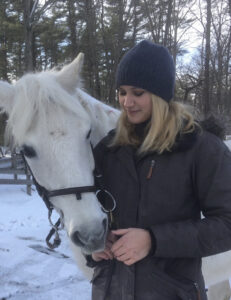Aubrey Specht, DVM Candidate and Award Winner, 2020 Tufts Vet Summer Research Training Program
Fall 2020 Featured Trainee:
 Aubrey Specht
Aubrey Specht
- Second-Year Graduate Student pursuing a Doctor of Veterinary Medicine (DVM) at the Cummings School of Veterinary Medicine at Tufts University
- Winner, Basic Science Award – 2020 Tufts Vet Summer Research Training Program
Aubrey Specht is a second-year graduate student at the Cummings School of Veterinary Medicine at Tufts University pursuing her Doctor of Veterinary Medicine (DVM) and a certificate in International Veterinary Medicine focusing on globally important diseases. As a board member of the Students for One Health Club, Aubrey uses “One Health” to understand the interconnection of animals, people and the environment with regard to infectious disease. (One Health is of particular importance to the Levy CIMAR and our mission to combat the global threat of antimicrobial resistance—or AMR.)
As part of the 2020 Cummings Summer Research Training Program, Aubrey worked with Levy CIMAR Core Faculty member, Dr. Gillian Beamer, an Assistant Professor in the Department of Infectious Disease and Global Health, on a study to detect the presence of cross-reactive antibodies to the SARS-CoV-2 pathogen in the serum of BCG-vaccinated mice. The Bacille Calmette-Guerin (BCG) vaccine, composed of live, attenuated Mycobacterium bovis, is the only vaccine available for human use against tuberculosis (TB). However, the impact of this hundred-year-old vaccine extends beyond just defense against TB. Both epidemiological evidence and basic research support cross-protective immunological benefits to BCG vaccination against many pathogens unrelated to mycobacteria, including viruses. For this pilot study, the team tested serum from individual BCG-vaccinated mice for the presence of antibodies reactive to the spike protein on the SARS-CoV-2 pathogen using a technique called enzyme-linked immunosorbent assay (ELISA). Aubrey won the training program’s Basic Science Award for this her efforts. The research is ongoing, but the results of the study could aid in the search for defense against COVID-19 through 1) the development of a vaccine to optimize the humoral immune response to the pathogen and 2) an awareness of the impact cross-reactive antibodies may have in generating false positives in serological tests from BCG-vaccinated humans.
As part of another project in Dr. Beamer’s laboratory, Aubrey is analyzing lung biomarkers to identify correlates of “supersusceptibility” to Mycobacterium tuberculosis in the Diversity Outbred mouse population. By studying responses of each genetically distinct mouse, Aubrey is helping to identify diagnostic features and prognostic indicators of TB, that can be translated to human patients. There is a current need for early diagnosis of TB to inform treatment decisions.
Growing up in a family of research scientists, Aubrey says an appreciation of the natural world as well as the scientific process through which one learns about it was ingrained in her from an early age. Prior to enrolling at Cummings, she earned her undergraduate degree in biochemistry also from Tufts University. She worked with Dr. Juliet Fuhrman in the Department of Biology, where she developed an interest in researching infectious diseases. There, she investigated chitin deacetylase (CDA) gene expression, in response to the virulence of ingested bacteria in Caenorhabditis elegans, as a model for parastitic nematodes. Future treatments against filarial nematodes may target chitin metabolism, specifically the disruption of CDAs, to undermine the worm’s virulence and reproduction.
As an undergraduate Tufts Summer Scholar, Aubrey also conducted an original a project titled, “Making the Journey from Wild to Tame: What Makes Some Wild Horses More Adoptable” with Dr. Allen Rutberg of the Center for Animals and Public Policy as her advisor. Ultimately, this work piqued Aubrey’s interests in veterinary medicine and led her to enroll at Cummings.
Away from the lab, Aubrey serves as co-president of the Diagnostic Imaging Club, and works part-time as a technician in the radiology department. Additionally, she works with Cummings professor and surgeon Dr. Carl Kirker-Head, on the development of an animal welfare-oriented, international database of animal fracture repair literature, Fracture Research Animal Models Database (FRAMD).
When she completes her veterinary studies at Cummings, Aubrey plans to further pursue infectious disease research. Building upon what she already learned, she hopes to investigate more clinically oriented research to better understand how diseases are detected and treated, the pathogenesis of disease, and to focus on appropriate antimicrobial stewardship.




